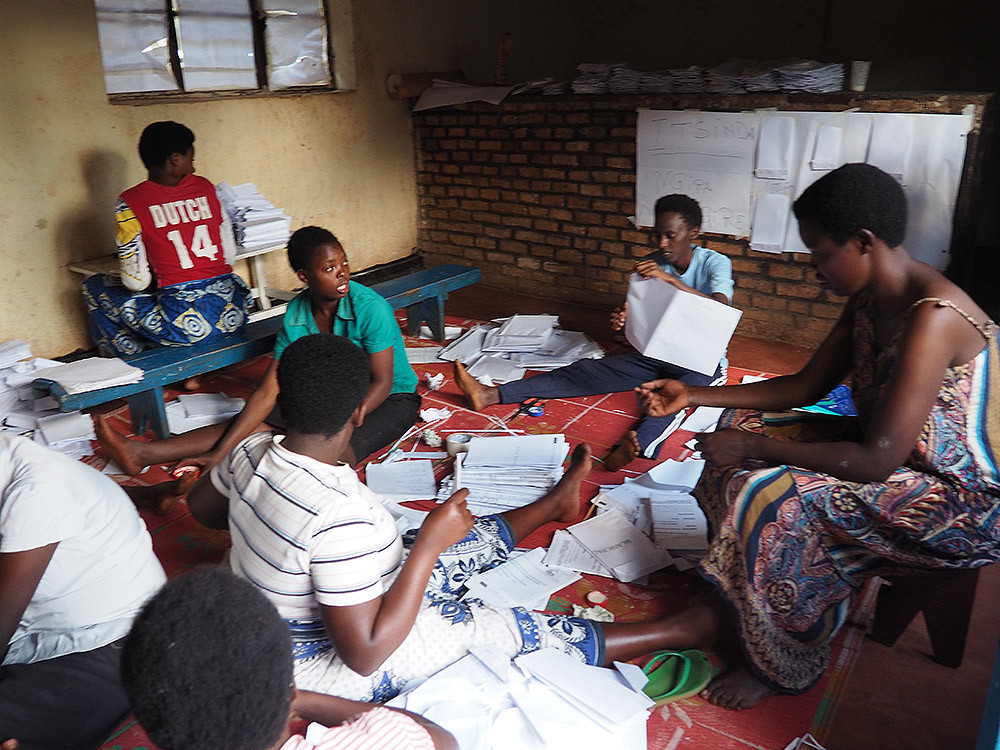
Partnering to Create Opportunity for East Africa’s Young People
When Nadia Uwineza graduated from high school in rural eastern Rwanda a few years ago, she joined more than 11 million young people across Africa who enter the labour market annually. Like many of her peers, she faced bleak economic prospects.
Combined, African economies generate just three million new formal-sector jobs per year, and they are disproportionately located in urban areas. This leaves many rural young people like Nadia with very little choice: unemployment and unpaid or poorly paid work on family farms and in menial jobs.
Nadia’s prospects changed when she enrolled in training at a government youth centre that was working with the Strengthening Rural Youth Development through Enterprise (STRYDE) program; a partnership between Mastercard Foundation and TechnoServe.
Designed to help young people in rural East Africa create economic opportunities in their communities, the STRYDE program builds their entrepreneurial and personal finance skills, as well as “soft skills” such as planning, self-confidence and gender sensitivity. The first phase of the program launched in 2011 and trained 15,000 young people across Kenya, Rwanda, and Uganda within five years. Each of the participants received three months of training and nine months of tailored post-training support called “aftercare.”
Opportunities for youth, families, and communities
The first phase of STRYDE had a significant impact on the lives of the participants. An independent evaluation found that the number of participants who were idle – underemployed and not in school – fell by more than 80 percent after they completed the program. The study also found a significant increase in the percentage of respondents holding a wage-paying job or running their own businesses.
Ninety-five percent of participants reported that their income had increased, and more than half said that the increase was substantial. Incomes increased by an astounding average of 133 percent.
In addition, 62 percent of participants successfully borrowed money from banks, cooperatives and/or mobile operators. Comparatively, before enrolling in the program, the major source of funding were family and friends. Ninety-six percent of participants reported having increased savings, with close to 60 percent saying that their savings increased substantially.
Qualitative analysis of the program found that female participants were equally as successful as male participants. This is notable because women in rural communities often face several obstacles to economic success, including limited access to information, finance, capital, and land, as well as cultural norms that assign them much of the domestic responsibilities. The project worked to address these inequalities by engaging the entire family and in discussions about the importance of women receiving training and bringing additional income to the household.
The evaluation also found that the program changed community perceptions about the role of women. For example, a participant from Uganda named Ritah started a soap-making business after completing her training. Her perception of gender roles changed and she now realizes that a woman “is capable of doing any job that a man can do.” She further noted that she feels empowered in her home and knows that she can support her family if her husband experiences a period of unemployment.
This was not the only change that communities saw as a result of the STRYDE program. Perceptions of young people changed in many cases, and some of the youth ascended to positions of responsibility in their communities. Participants’ small businesses also brought economic vitality to their rural communities. One brickmaker in Rwanda, for example, currently employs 40 people.
Sustaining success
In 2014, the Mastercard Foundation and TechnoServe launched a second phase of the STRYDE program. This phase added an innovative component to scale up the program’s success, aiming to train more than 48,000 young people in Kenya, Rwanda, Uganda, and Tanzania by 2019, and ensure that training continues after the program ends.
To do that, STRYDE partnered with 81 local organizations to deliver its curriculum, including vocational training institutes, nonprofit organizations, universities, faith-based organizations, and prisons. STRYDE staff work with these organizations to incorporate the STRYDE modules into their existing activities and strengthen their capacity to deliver the training.
Today, these partner organizations are delivering the STRYDE model to more than one third of the program’s participants, including Nadia.
After Nadia learned how to identify business opportunities in her own community, she hit upon a unique idea. The Rwandan government recently banned the use of plastic bags to protect the environment. Nadia saw this as an opportunity to launch a business with her local women’s group, and began purchasing scrap paper to make low-cost paper shopping bags. These bags are sold to local market vendors and stores to provide to shoppers. The business currently provides income for 23 women and allows Nadia to put away savings each month. She now plans to expand the business to neighbouring districts.
Across East Africa, there are thousands of young people with the potential to be the next Nadia. With the right support, they can help to transform not only their own lives, but their families and communities as well.
Evidence from the STRYDE program, which began with skills training and evolved into institutional strengthening at the local level, demonstrates the value of working together towards sustainable solutions for youth employment and entrepreneurship.


